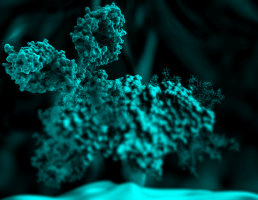
An investigational antibody-drug conjugate called MM-302 was safe, tolerable, and showed signs of clinical activity in heavily pretreated patients with metastatic, HER2-positive breast cancer, according to data from a phase I clinical trial presented at the AACR Annual Meeting 2015, April 18-22.
MM-302 is an antibody-drug conjugate composed of a HER2-targeted antibody linked to the cytotoxic chemotherapy liposomal doxorubicin.
The HER2 antibody delivers the liposomal doxorubicin to HER2-positive breast cancer cells.
“The main purpose of our study was to establish whether MM-302, alone or in combination with trastuzumab, was safe and tolerable for patients with metastatic, HER2-positive breast cancer whose disease had progressed following numerous prior treatments,” said Patricia LoRusso, DO, associate director of innovative medicine and professor of medicine (medical oncology) at Yale Cancer Centre in New Haven, Connecticut, and professor of medicine in the Division of Oncology at Yale University.
“We found that the drug was well tolerated when administered to these women.” The most common grade 3 or 4 side effect was neutropenia, which was observed in eight patients.
Protocol-defined asymptomatic changes in left ventricular ejection fraction were seen in six patients.
In only one patient was it significant enough to be reported as a grade 1, possibly drug-related, adverse event.
“We also saw responses in these women, particularly in those that were anthracycline-naïve,” continued LoRusso.
“Given that many of the patients had disease that had progressed following treatment with trastuzumab [Herceptin], T-DM1 [Kadcyla], and pertuzumab [Perjeta], these results are encouraging and led to the ongoing randomised, phase II HERMIONE clinical trial, which is testing whether MM-302 plus trastuzumab is more effective than chemotherapy of physician’s choice plus trastuzumab for locally advanced/metastatic, HER2-positive breast cancer.
“If the results of HERMIONE are positive, MM-302 may provide another therapeutic option for women with HER2-positive breast cancer,” LoRusso added.
Sixty-nine patients were enrolled in the phase I clinical trial conducted by LoRusso and colleagues and assigned to one of four arms, investigating MM-302 alone or in combination with trastuzumab, or trastuzumab and cyclophosphamide.
Eleven percent of the 62 patients treated with 30 mg per m2 or more MM-302, alone or in combination with trastuzumab, responded to treatment.
Overall, the median time to disease progression was 7.6 months. In the subset of patients treated who were anthracycline-naïve, a median progression-free survival of 11 months was observed, with a response rate in this patient subset of 24 percent.
Source: AACR
We are an independent charity and are not backed by a large company or society. We raise every penny ourselves to improve the standards of cancer care through education. You can help us continue our work to address inequalities in cancer care by making a donation.
Any donation, however small, contributes directly towards the costs of creating and sharing free oncology education.
Together we can get better outcomes for patients by tackling global inequalities in access to the results of cancer research.
Thank you for your support.